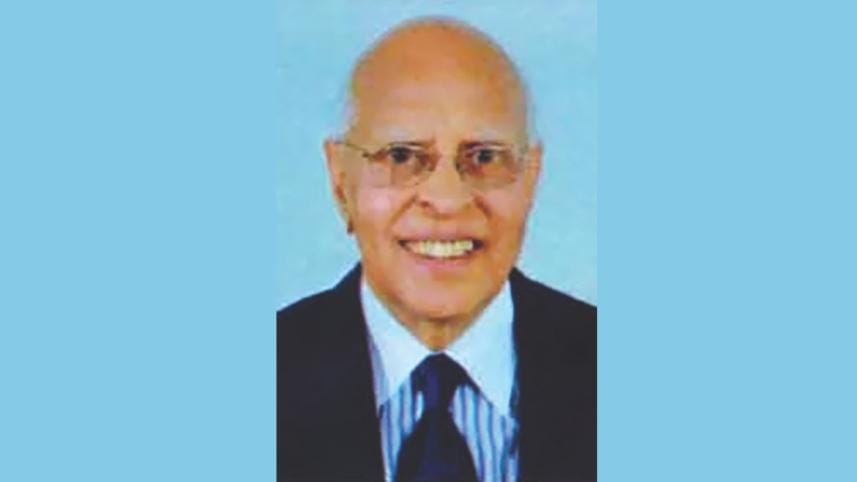Adieu my friend, Ambassador Harun ur Rashid

This is to redeem my pledge to my friend and classmate Ambassador Harun ur Rashid and write his obituary if I survive him. With his death, perhaps one of the rare, genteel specimens of a perfect gentleman from our generation has passed away. After his retirement, he was a regular contributor to The Daily Star and a prolific writer. Whenever I appreciated his writing, he jokingly used to say that my articles in The Daily Star, which were written after long intervals, were like missiles–precise, hard hitting and lethal, unlike his writings.
I have known Harun since the early fifties, when we were students of the English department in Dhaka University. Harun stood out in the crowd of our batch of 17 students–which included Dilara Hashem, Ruhul Amin Mazumder, Ali Anwar, Masud Ahmed, Amir Ali, Waseq Al Azad, Nazibul Haq Ansari and others–for his sophisticated lifestyle, aristocratic tastes and temperament, impeccable dress, charming personality and inimitable wit and humour. While we were wearing ordinary panjabi pajamas, he looked elegant in his white sharkskin suit and shining shoes.
He became a barrister by accident. While studying for his Masters, he became seriously ill, with severe pains in his leg. He was under treatment in Mitford Hospital for about a year when doctors diagnosed his illness as bone tuberculosis and suggested amputation of his leg. He sat for his final MA examinations while bedridden and received a high second class. Professor Turner, who had a great deal of affection for this student of his, was not convinced with the diagnosis of this illness and recommended further treatment in London. He wrote a letter of recommendation addressed to whomever it may concern, with a copy for President Ayub Khan, suggesting that Harun was a brilliant student and needed support for his treatment in London. I used to visit him often in the hospital with food prepared for him by my mother. One day, he looked in high spirits and showed me a letter received from the military secretary of President Ayub Khan, telling him to collect his ticket to London from the PIA office in Motijheel. Over there, the doctors diagnosed his illness as arthritis and soon he was cured. He became a teacher in a school and went on to study to become a barrister.
Harun returned home as a Barrister from Lincoln's Inn, started practising in Dhaka High Court, and married Nazma Bhabi, daughter of Amin Ahmed, the first Chief Justice of East Pakistan. Meanwhile in the 60s, after serving as a Professor of English in Ananda Mohan College, Mymensingh for over four years and a brief stint with APP as a journalist along with Mahbubul Alam, Amanullah, Saiful Bari, Jawadul Karim and Mozammel, while I moved to Islamabad to work as a senior research assistant in the information ministry headed by the amazing Altaf Gauhar as secretary. One day, to my surprise, Harun showed up at my residence and said he had joined as Deputy Legal Advisor in the foreign ministry. After that, we met often at our residences, dined together and went on sightseeing visits to the Murree Hills, Lahore Fort and Landi Kotal Market in Peshawar.
After the independence of Bangladesh, we worked together in the foreign ministry. He had since left his job as a legal advisor and joined the political desk of DG South Asia. He was later inducted into the foreign service but often felt himself as a stranger among the tribe of his career diplomat colleagues. However, with his legal background, he soon grasped fully to his advantage the negotiating skills needed in diplomacy and acquitted himself as an astute diplomat as Ambassador for Bangladesh in Nepal, Australia, the Philippines and Austria. After retirement, he maintained contact with local diplomats and hosted parties and dinners for them.
Again as first secretary at Bangladesh's Mission in Calcutta, I worked with Harun who was then head of the Mission, but we remained as good friends as ever, with no frayed nerves between the boss and the subordinate. While I was working in our UN mission in New York in the 80s, I hosted Nazma Bhabi, who was visiting the US with their daughter Sabrina for her admission into college. Sabrina has since done her PhD and is now teaching at BRAC University.
Most of my class friends have passed away. Another classmate, Ruhul Amin, is in a coma for over a year after suffering a stroke. Their deaths remind me of Donne's poem–"Dont ask me for whom the bell tolls, it tolls for thee." I am in the departure lounge waiting for the last and final call to join my dear, departed friend Harun.
Abdul Hannan is a former diplomat of Bangladesh.




 For all latest news, follow The Daily Star's Google News channel.
For all latest news, follow The Daily Star's Google News channel.
Comments